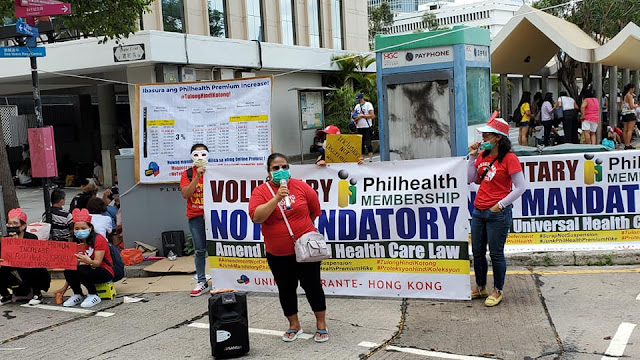By Daisy CL Mandap
 |
| Pelaez speaking at an anti PhilHealth rally in Central in 2021 |
Migrant
workers groups have again hit out at the Philippine Health Insurance Corp
(PhilHealth) after it announced that it will start collecting the mandated four
percent annual premium from members starting next month.
In a statement issued Wednesday, PhilHealth said it would resume collecting the higher rate on Malacanang’s directive, after lawmakers failed to pass a law suspending the mandated increases.
Previously, President Rodrigo R. Duterte suspended the collection of the accelerated premium contributions from members amid the pandemic following raucous protests from Filipino migrant workers around the globe.
 |
| PINDUTIN PARA SA DETALYE |
The collection of higher PhilHealth contributions is provided for in the Universal Health Care Act passed in 2018, which mandated premium rates to gradually increase from 2.75% in 2019 until it reaches 5% for both 2024 and 2025, with a salary cap of Php80,000.
For Filipino domestic workers in Hong Kong earning the minimum wage of $4,630 which is the equivalent of Php30,000, this would mean an annual premium of Php14,400 this year. That’s a massive six-fold increase from the flat rate of Php2,400 collected from them before the new law was passed.
What makes the burden far heavier for migrant workers is that failing to collect directly from their employers, PhilHealth, like the Social Security System, classifies them as “self-paying,” meaning they get to bear the financial burden of both employer and employee.
 | |
|
PhilHealth said in its statement that the 4% contribution rate will be collected starting in June. Those who paid at the old rate of 3% from January to May will be allowed to pay the difference until December this year without interest.
“PhilHealth assures all members that legislated contribution schedule will continue to provide all Filipinos with adequate financial protection against hospitalization costs,” the state health insurer said.
The announcement was immediately condemned by Bayan Muna Partylist Hong Kong which called the PhilHealth premium hike as government extortion.
 |
| PRESS FOR DETAILS! |
The group called not just for the scrapping of the higher rates but also of mandatory membership for Filipino migrant workers who they say are already covered by a medical insurance that their employers are obliged to take in their name under Hong Kong laws.
Bayan Muna Hong Kong chair Dolores Balladares Pelaez said the money paid to PhilHealth will be of better use if sent to their families back in the Philippines instead of a government agency “with unresolved corruption scandals.”
In 2020, Philippine lawmakers initiated an investigation into alleged corruption in PhilHealth, after whistleblowers had claimed that up to Php15 billion in funds were pocketed by its executives.
 |
| PINDUTIN PARA SA DETALYE |
The allegation sparked anger among Filipinos, as the country was then experiencing the worst Covid-19 outbreak in Southeast Asia.
However, PhilHealth officials have denied the allegation and after a few highly publicized congressional hearings, the issue died down.
 |
| A sign-up desk for a petition to stop all government exactions on Filipino migrant workers (File) |
Pelaez said whoever wins in the upcoming presidential election will have to deal with the PhilHealth issue right away.
Should Vice President Leni Robredo win, Pelaez said there is hope that the mandatory collection of PhilHealth premiums from OFWs will be stopped.
But if the vote goes to her main rival, Ferdinand Marcos, Jr., an avowed Duterte supporter, Pelaez said not only will the higher PhilHealth fees be implemented, but there is also a possibility that other government fees will be collected.
Just recently, migrant workers groups were also up in arms after the Philippine Overseas Employment Agency announced that OFWs will have to pay for membership in Pag-IBIG Fund before they can be issued overseas employment certificates.
The Fund is responsible for the administration of the national savings program and affordable housing financing for Filipinos while the OEC serves as the exit pass for OFWs who are about to leave the country or return to their jobsites abroad.
Currently, the OEC is not tied to either PhilHealth or Pag-IBIG Fund so Filipino migrant workers are not obliged to pay for membership to either agency.














